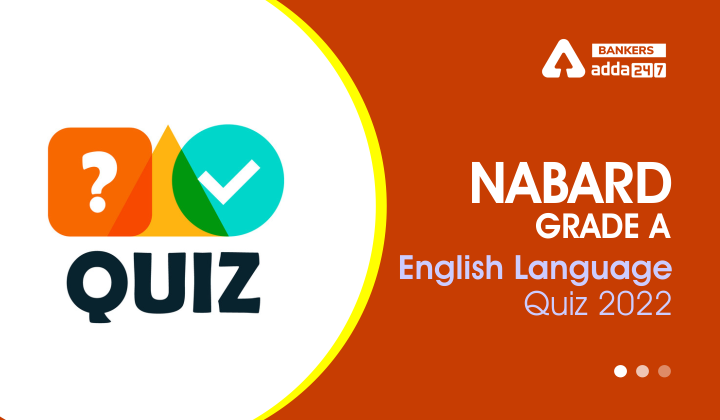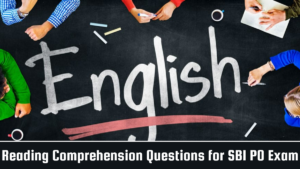Directions (1-5): In the following passage, some of the words have been left out, each of which is indicated by a number. Find the suitable word from the options given against each number and fill up the blanks with appropriate words to make the paragraph meaningful.
He was a charismatic leader, an entrepreneur and a highly effective manager all rolled into one. As a leader, he …(1)… the company’s growth plan in a dedicated manner and he never lost focus. The cement industry in those days was doing badly. …(2)… to everyone’s expectations he sanctioned an additional plant in no time. He was (3) that since the cement industry was cyclic in nature, by the time the plant was operational the market would have improved. It did happen and the decision brought rich rewards when the plant was commissioned.
Not only was he a great entrepreneur but he also …(4)… all his senior people to be ‘practising entrepreneurs’. I have seen a similar example at the Asian Institute of Management, which allows its professors to …(5)… their own business. This made their lectures more practical and less theoretical. It is the secret of the Institute’s success.
Q1.
(a) achieved
(b) implemented
(c) visualised
(d) persevered
(e) aimed
Q2.
(a) Contrary
(b) Opposite
(c) Yet
(d) Obedient
(e) Different
Q3.
(a) known
(b) calculating
(c) certain
(d) dreamt
(e) surely
Q4.
(a) thought
(b) tried
(c) wished
(d) encourage
(e) wanted
Q5.
(a) expand
(b) function
(c) chose
(d) run
(e) risk
Directions (6-10) : Rearrange the given six sentences/group of sentences (A), (B), (C), (D), (E) and (F) in a proper sequence so as to form a meaningful paragraph and then answer the given questions.
(A) Since public sector ill seems to be irremediable and private management promises a hope, I would prefer privatisation of the perpetually ailing establishments.
(B) However, this is the likely sequel in the long run even in what are regarded as hopeless cases.
(C) Disinvestment of a few enterprises will not necessarily turn losing concerns into highly profitable establishments in a short time.
(D) so, the Union Government has lately been actively considering sale or transfer of some leading concerns to private entrepreneurs to prevent loss to public exchequer.
(E) The question has often been raised whether privatisation offers a panacea for the numerous ills of the public sector.
(F) The argument for such a course gets even stronger because of the failure of the official efforts to revive these ailing concerns.
Q6. Which of the following should be the FOURTH sentence after rearrangement?
(a) A (b) B
(c) C (d) F
(e) D
Q7. Which of the following should be the SECOND sentence after rearrangement?
(a) A (b) B
(c) F (d) D
(e) E
Q8. Which of the following should be the SIXTH (LAST) sentence after rearrangement?
(a) E (b) D
(c) A (d) B
(e) F
Q9. Which of the following should be the FIFTH sentence after rearrangement?
(a) A (b) D
(c) E (d) F
(e) C
Q10. Which of the following should be the FIRST sentence after rearrangement?
(a) A (b) F
(c) B (d) C
(e) E
Directions (11-15) :Find out the error, if any. If there is no error, the answer is (e), i.e. No error. (Ignore the errors of punctuation, if any.)
Q11. The interrogation made by (a)/ him hardly yield (b)/ any concrete conclusion (c)/ about the crime. (d)/ No error (e).
(a) a
(b) b
(c) c
(d) d
(e) e
Q12. What you had said (a)/ about the employees was (b)/ found to be correct (c)/ but it could not be proved. (d)/ No error (e).
(a) a
(b) b
(c) c
(d) d
(e) e
Q13. When you had started (a)/ the work, you should (b)/ ensure that you (c)/ concentrate on it. (d)/ No error (e).
(a) a
(b) b
(c) c
(d) d
(e) e
Q14. If you have good (a)/ control over breathing, (b)/ you can float (c)/ on water effortlessly. (d)/ No error (e).
(a) a
(b) b
(c) c
(d) d
(e) e
Q15. The way to the fort (a)/ was too difficult that (b)/ we could not reach (c)/ the farthest point. (d)/ No error (e).
(a) a
(b) b
(c) c
(d) d
(e) e
Solutions
S1. Ans. (b)
S2. Ans. (a)
S3. Ans. (c)
S4. Ans. (e)
S5. Ans. (d)
S6. Ans. (e)
Sol. The correct sequence is EAFDCB.
S7. Ans. (a)
Sol. The correct sequence is EAFDCB.
S8. Ans. (d)
Sol. The correct sequence is EAFDCB.
S9. Ans. (e)
Sol. The correct sequence is EAFDCB.
S10. Ans. (e)
Sol. The correct sequence is EAFDCB.
S11. Ans. (b) Since the sentence is in the past tense, so replace ‘yield’ with ‘yielded’
S12. Ans. (c) When the verb ‘found’ is followed by an adjective, ‘to be’ is not used before the adjective. E.g. They were found safe and well. So, the sentence should be like ………… found correct ………
S13. Ans. (a) The tense of the sentence is ‘Present’, so replace ‘had started’ with ‘start’.
S14. Ans. (e) No error
S15. Ans. (b) Replace ‘too’ with ‘so’. [So ……… that’ ‘Too ……… to’] E.g. He is so weak that he cannot walk=He is too weak to walk.





 GA Capsule for SBI Clerk Mains 2025, Dow...
GA Capsule for SBI Clerk Mains 2025, Dow...
 The Hindu Review October 2022: Download ...
The Hindu Review October 2022: Download ...
 Reading Comprehension Questions for SBI ...
Reading Comprehension Questions for SBI ...





